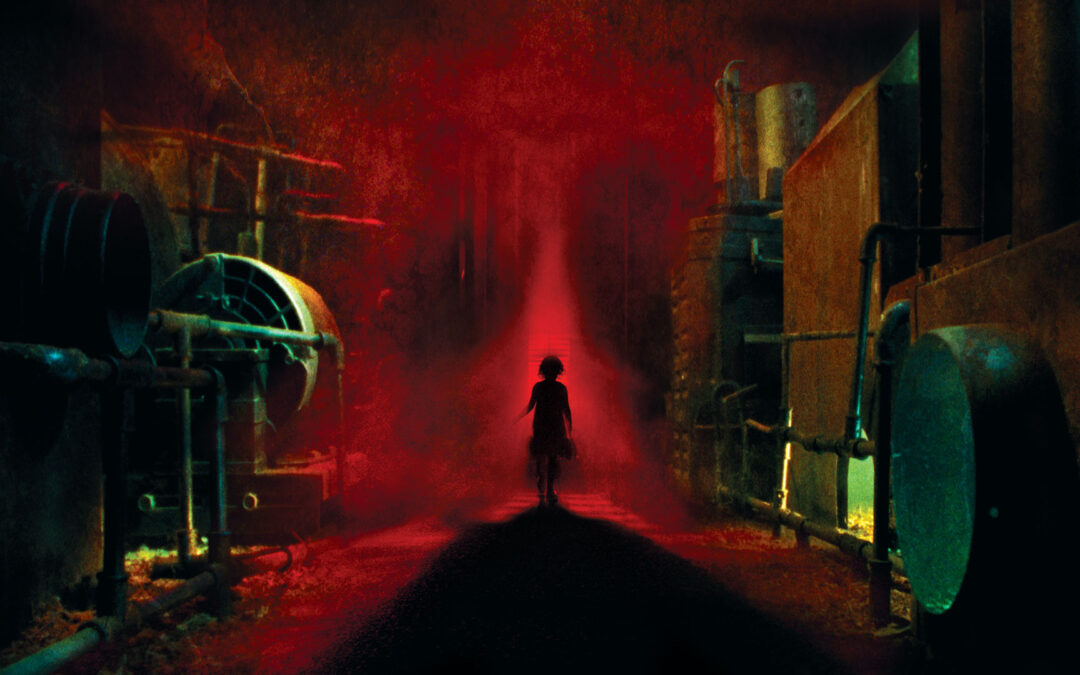(IMAGE: Fire Trial Films)
Fire Trial Films, 2022. Drama/Fantasy. 93 minutes.
RATING: 3 out of 4
Conceived initially as a photo shoot, then a music video, then a short, and finally a feature, Moon Garden retains elements of all four in its final iteration. But that’s mostly to the good. Like its mysterious antagonist, a Babadook-like creation with the head of a Silent Hill nurse and the stop-motion chattering teeth of any Jan Svankmajer film, this movie collects and absorbs the best parts of the goals it pursues. Mostly. There’s not a lot of story here beyond the premise of a girl in a coma, working her way back into consciousness via a mystical journey through fantasy realms. But for sheer visuals and atmosphere, this is a feast which combines the imagery of ’90s industrial goth rock videos (think Tool and Nine Inch Nails) with a wondrous and not-too scary fairy tale narrative. It’s the sort of balance that Neil Gaiman – and almost nobody else – routinely manages. Though as mentioned before, the script’s not quite up there with The Sandman or Coraline. But at least it aspires to be.
Shot entirely on expired 35 mm film found in a basement, this effects-heavy film amazingly features no CG, but rather heavy use of miniatures and optical tricks. A viewer looking closely enough and with some editing experience might be able to see the seams, but on the whole, the matching of full-size and tiny sets creates an effective illusion of continuity. It feels at times like watching a magic show – you sort of think you might know how the trick was done, but then it pulls out a new angle and you’re pleasantly stumped. Maybe some sorcery was involved, after all.
Young Emma (Haven Lee Harris) has a mentally ill mother and workaholic father, but still maintains a rich enough imagination to tell stories with her toys in the blue moonlight that constantly bathes her house. One night, when escaping a parental argument, she slips on the stairs and knocks herself out, awakening in another realm…a forest with surreal industrial touches, and occasional larger-than-life symbols of things in her past. With the aid of a vintage radio, she can hear her parents talking to her comatose self in the hospital back in reality. But she has to make it to high ground in order to signal them back, and a terrifying creature that consumes children’s tears is on her trail.
Emma’s journey is occasionally interrupted with memories, that sometimes do and sometimes don’t have direct bearing on what she’s doing in the moment. It’s dream logic of a sort, but while some connections are obvious – her favorite plush rhino becomes a giant mech, for example – others are less so. The accordion player in whiteface, for example.
Through no fault of her own, Harris can vary drastically as a lead. Sometimes physically, as this was shot over three years, and the older her occasionally looks like a stand-in of a different size. But also, when one considers this began as a photoshoot, a viewer can acknowledge that yes, she’s very photogenic, but had it been conceived as a movie all along, maybe a four year-old would have been flagged as a bit young to carry the film as an actress. No matter – the variance in size and delivery can always be chalked up to the Alice in Wonderland vibe. Any explicit label of “Drink me” may be absent, but this is a film that invites the viewer to thirstily imbibe its charms rather than scrutinize its narrative too much.
Still, it’s the writer-director who’s the real star here. Ryan Stevens Harris previously worked as an editor on Roland Emmerich’s Moonfall, and thus has some experience with fantasy realms involving the moon, albeit at the other end of the budgetary spectrum. He’s not quite a one-man show here, but close to it, serving also as editor, colorist, animator, sound designer, and visual effects artist. Mightily aided by Wolfgang Meyer’s cinematography and Delarey Wagener’s production design assistance, he’s not just focused on world-building metaphorically – he built much of the world in his own garage. Imagine what he could do on an actual soundstage.
###

